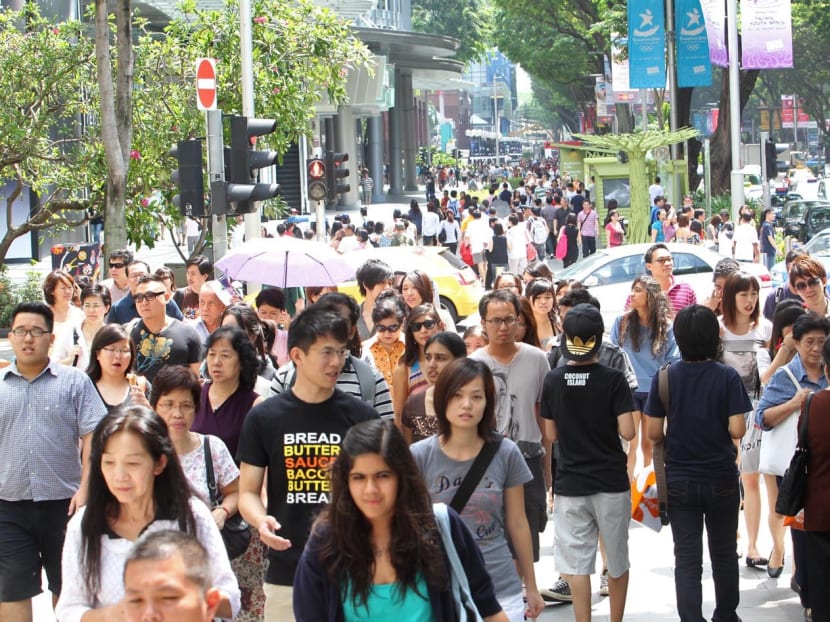GST could be raised to 9% in Budget 2018: DBS report
SINGAPORE — A DBS research report published on Tuesday (Nov 28) expects the government to raise the goods and services tax (GST) from 7 per cent to 9 per cent in next year’s Budget.
SINGAPORE — A DBS research report published on Tuesday (Nov 28) expects the government to raise the goods and services tax (GST) from 7 per cent to 9 per cent in next year’s Budget.
And the projected hike is likely to be staggered over the next two years, said the report by DBS senior economist Irvin Seah.
Mr Seah estimated that a 1-percentage-point increase in GST would bring in an additional S$1.6billion to S$1.8billion in tax revenue for the government — equivalent to 0.4 per cent of Singapore’s nominal gross domestic product.
“Hiking the GST is politically challenging given its regressive nature. In this regard, timing is crucial. With the next General Election (GE) due (by January 2021), policymakers will have to act fast… the GST is perhaps the most direct and effective tool in terms of raising tax revenue,” Mr Seah said.
Senior Minister of State (Finance) Indranee Rajah told the Straits Times in an interview published on Sunday that the Government has not decided on the date of the impending tax hike. She added that the Government will take into account factors such as setting aside enough time for people to absorb the news, and ensuring the needy “have enough buffer” against the impact.
Speaking to TODAY, Mr Seah said he expects the GST hike to be announced during the Budget statement - which is traditionally delivered in February or March - and implemented in the second half of next year.
However, other economists whom TODAY spoke to were divided on whether a GST hike could kick in so soon, given that the Government could require more time to explain why it is raising taxes, and the fact that consumer spending had picked up only recently.
CIMB economist Song Seng Wun said he expects an increase in GST to be implemented in 2019. “I think the government will likely use next year’s Budget to explain fully the rationale (behind a hike),” he said.
He added: “We are likely to see a small deficit in next year’s Budget, which will set the backdrop for the government to explain why there is a need to increase GST.”
Maybank economist Chua Hak Bin also felt that it “does not seem appropriate” to raise GST next year. “Consumer spending has only started to pick up and raising the GST now might just puncture this recovery,” Dr Chua said.
IHS Markit economist Bernard Aw, however, agreed with Mr Seah. “Singapore’s economy has been strengthening this year, and recent Nikkei Singapore Purchasing Managers’ Index data suggest that the current upturn is likely to continue into 2018. (This creates) a more favourable economic climate for raising the consumption tax,” said Mr Aw.
Apart from investments in infrastructure and the economy, the government will incur heavy spending on social services and safety nets, including healthcare.
Speaking at the People’s Action Party convention on Nov 19, Prime Minister Lee Hsien Loong reiterated that it is a matter of when and not if taxes will be raised. He added that “well before the time comes”, the Government will explain to Singaporeans what the money is needed for and show how it will benefit the young and old.
While the economists differed on the timing of the GST hike, they agreed that it would likely be raised by 2 percentage points, going by the previous two rounds of GST increases.
Singapore first implemented a GST of 3 per cent in 1994. It was increased to 4 per cent in 2003, and to 5 per cent in 2004. The rate went up to the current 7 per cent in 2007. Each time, the hike was accompanied by an offset package to cushion the impact on households.
Instead of staggering the next GST hike over two years, Mr Song felt that the Government should “bite the bullet and introduce it in one go, so that the people can move on”.
While political leaders including Mr Lee and Deputy Prime Minister Tharman Shanmugaratnam have said the Government has enough revenue for its current term, the economists believe that any GST hike will be introduced before the next GE.
“Nobody likes an increase in taxes, it is a huge political task to explain to the public why such an increase is needed. The hikes will likely be carried out under the current term, so as to allow the next generation of leaders to focus on other issues,” Mr Song said.
Should the next round of hike come to pass, Mr Seah said in his report that there could be an offset package worth at least S$4 billion to help consumers and lower-income households cope.
At 7 per cent, Singapore’s GST is low compared with other countries in the region, Mr Seah noted. For example, China and New Zealand impose a general consumption tax of 17 per cent and 15 per cent respectively. South Korea, Vietnam, Indonesia and Australia levy GST or value-added tax of 10 per cent.
Among the major tax options, GST was most likely to be raised, Mr Seah said. He pointed out that “competitiveness is at stake” if the corporate income tax rate is increased, while the top-tier personal income tax rate was raised to 22 per cent recently.
Nevertheless, Dr Chua said he expects the Government to consider imposing taxes on e-commerce as the “first priority”. “The rise of e-commerce has meant that shoppers can bypass the GST by purchasing goods online, and this has disrupted the retail industry in Singapore,” he added.










